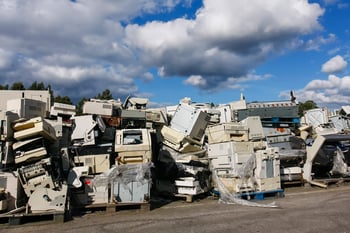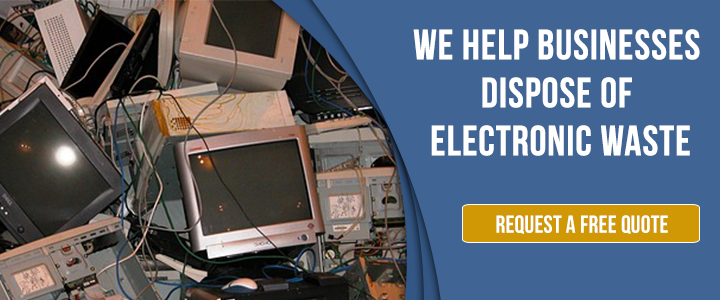In today’s device-saturated world, we usually only think about how we are using our current devices and, when the time comes, thinking about what to do next. What we don’t frequently think about is what we’ll do with that technology when it wears out.
Environmentally speaking, e-waste is something we all need to take more seriously. According to Earth911, “The United States generated 6.92 million tons of e-waste, about 46 pounds per person, in 2019. It recycled only 15% of the material.” That is a huge amount of waste impacting the environment and not getting put to good purpose in a second life.
The truth is, e-waste – short for “electronic waste” – is just as much a reality as e-purchases. When laptops, phones or even server stacks come to the end of their useful life, what do you do with them? Typically, companies have two options: drop them off at a recycling facility or enlist the services of a waste disposal company.
Heading to a recycling facility might seem like the easier choice, but it’s usually not the best one. Here are four reasons why enlisting the services of an electronic waste disposal company is the way to go for many organizations.
1. You Are Responsible For Cradle To Grave
First of all, what is cradle to grave? It’s the concept that the lifecycle![]() extends from the moment a piece of technology is “born” to the moment it gets retired for the last time, and you are responsible for it that entire time. In many cases, refurbishment can extend the useful life of any given device or piece of electronic equipment, but eventually, its time will come.
extends from the moment a piece of technology is “born” to the moment it gets retired for the last time, and you are responsible for it that entire time. In many cases, refurbishment can extend the useful life of any given device or piece of electronic equipment, but eventually, its time will come.
When that happens, you’re responsible for proper disposal. Responsible recycling means:
- Determining whether electronic devices have any useful life left
- Keeping them out of landfill, where they leach chemicals and other unhealthy substances into soil, air and groundwater
- Getting them to the proper recycling facility, as otherwise they will likely get thrown away by a recycler who can’t make use of them
Unfortunately, while drop-off facilities exist, many businesses find it quite difficult to determine which will meet their needs. If you choose incorrectly, you might be liable. This also applies if you turn over something potentially hazardous to an employee, who might discard it improperly, or have an accident on the way to the facility.
In all of the above cases, such a mistake could cost you unimaginable time and money. Your company might not survive. That’s best avoided at all costs, especially in the case of truly hazardous materials.
2. It Can Be Difficult To Determine What Is Hazardous
E-waste recycling can prove challenging to companies as well as individuals because it’s not always clear what’s hazardous. Runoff from a waste processing facility, heavy metals discharged from industrial operations, barrels of toxic sludge … these are all obvious hazardous waste materials.
individuals because it’s not always clear what’s hazardous. Runoff from a waste processing facility, heavy metals discharged from industrial operations, barrels of toxic sludge … these are all obvious hazardous waste materials.
Others are not so obvious, such as discarded electronic equipment. Laptops, cell phones, A/V equipment and even blenders seem innocent enough when they’re sitting on your counter, but unfortunately, they become much less harmless when they hit the landfill.
Once electronics warm up, they start offgassing toxic chemicals into the atmosphere. This degrades the air and contributes to the greenhouse effect. Illegal burning can cause serious health hazards, but even legal incineration at landfill and recycling facilities can pollute the air and pose a risk to human health.
Proper waste management can help avoid all this, but again, the question becomes...What constitutes hazardous waste? A waste disposal company can help identify materials or simply dispose of them so you don’t have to worry about taking equipment apart to separate non-hazardous components from hazardous components.
3. Waste Disposal Companies Can Accept Items Facilities Cannot
Not all waste management facility can accept every type of e-waste, either. You might have a specific type that isn’t taken at any facility because they don’t have the infrastructure to deal with it. That’s a frustrating situation to be in.
Other times, you can find a facility to meet every e-waste need … but not all in the same place. Then you have to go to multiple different places, all the while hoping an accident doesn’t occur along the way. And during pandemic times, even those that ordinarily would be open might not be.
Waste disposal companies, on the other hand, can dispose of almost any kind of electronic equipment. They have access to proper facilities, take a huge range of waste and save you the trip.
4. Waste Disposal Companies Can Discard Large Quantities, Quickly
Large quantities also pose a challenge. While a computer or two might not prove too difficult to dispose of, what about a hundred computers? This is common enough when a large office or a school switches out all its devices to newer models. Or suppose your lab is updated all of its electronic equipment at once? In such situations, contacting a waste disposal company is by far the smarter choice.
might not prove too difficult to dispose of, what about a hundred computers? This is common enough when a large office or a school switches out all its devices to newer models. Or suppose your lab is updated all of its electronic equipment at once? In such situations, contacting a waste disposal company is by far the smarter choice.
Beyond the volume issue, electronic waste disposal companies can also help by saving valuable time. Assigning employees to deal with large consignments of waste puts a major dent in productivity, after all.
Plus, that would mean you’re paying for the transportation of all that equipment yourself. Even single-day rates for a moving truck or other large vehicle in-town can stack up. With a recycling company, you can roll all the costs into one affordable bill and keep your employees at their own desks.
So next time you need to dispose of your old technology properly, make sure to think through your choices carefully. It’s simple and efficient to use an electronic waste disposal company, and hey – you’ll save on gas too!


Comment